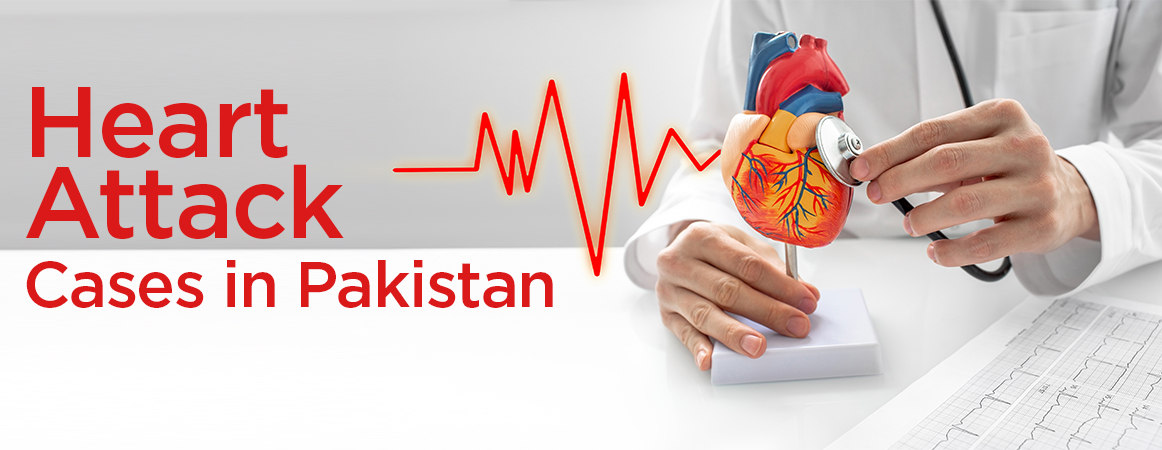
Heart disease claims the lives of 17 million individuals every year around the world. In 2016, roughly 19 percent of deaths in Pakistan were attributable to heart-related disorders, a figure that has now grown to 29 percent.
According to the most recent WHO data on heart attack ratio in Pakistan, 240,720 people died from coronary heart disease in Pakistan in 2020, accounting for 16.49 percent of all fatalities. Pakistan is ranked #30 in the world with a death rate of 193.56 per 100,000 people.
The major symptoms of a heart attack are:
Heart attack symptoms in women
Heart attack symptoms unrelated to chest pain are more common in women than in males, including:
Women, in comparison to males, are more likely to have symptoms while resting or even asleep. Emotional stress may contribute to the onset of heart attack symptoms in women.
Even though men and women are equally susceptible to heart disease, the heart attack ratio in Pakistani females is often higher. Women’s risk of dying or getting very ill as a result of heart disease is often underestimated due to under-diagnosis and under-treatment.
Women, contrary to a popular assumption, are just as susceptible to heart disease as men. They do, however, suffer sex-specific risks such as early menstruation, menopause, and pregnancy-related issues including preeclampsia. Women with diabetes are also more likely than men to die from cardiovascular illnesses.
Smoking and tobacco usage are on the rise in Pakistan, resulting in a high rate of heart attacks in Pakistan among the youth. People in their early 40s are developing heart disease as a result of a sedentary lifestyle, junk food consumption, lack of sleep, and excessive smoking among the youth of the country.
Heart disease is the leading cause of death globally. Smoking, excessive intake of sugar-sweetened beverages, diabetes, high blood pressure, a sedentary lifestyle, and obesity are all factors that contribute to heart attacks in Pakistan.
Treatment for heart disease is costly, and it is vital to give up unhealthy habits to avoid it.
Cardiovascular disease has become the leading cause of death in Pakistan, with heart attacks often occurring in people under the age of 30.
Due to a sedentary lifestyle and other risk factors such as heavy smoking, deaths from cardiovascular disease in the age group of 30 to 40 years are becoming more common in Pakistan.
Hypertension (high blood pressure) is increasing in young adults between the ages of 30 and 40, which can lead to a heart attack. Smoking and tobacco usage are on the rise in Pakistan, contributing to an increase in the number of heart attacks among the country’s youth.
Until after menopause, when estrogen levels drop, estrogen provides some protection against heart disease for women. As a result, the average age of a heart attack in women is 70, whereas in men it is 66.
In Pakistan, one in every four middle-aged adults has coronary artery disease. Young people and women are both at high risk. Cardiovascular illness is on the rise in Pakistan, and concerted measures are needed to combat the epidemic and lower the heart attack ratio in Pakistan, with an emphasis on hypertension, diabetes, smoking, and excessive cholesterol levels.
According to WHO data from 2016, about 250,000 people died each year in Pakistan due to heart diseases, accounting for 19% of all deaths. However, in only three years, the WHO has found a 29 percent increase in total deaths related to heart diseases in Pakistan, totaling around 406,870 each year.
MMI provides accessible and affordable quality health care to all. The cardiology department at MMI provides cardiac care for patients with heart conditions. Our cardiologist provides comprehensive and compassionate care, as well as advanced cardiac care.
FAQ about Heart Attack cases in Pakistan:
Commonly prescribed medicines for heart attack in Pakistan are:
Heart attacks can be avoided with a heart attack prevention kit in Pakistan containing medicines, Angisid tablet, to keep under the tongue, Dispirin to chew, and a Deponit NTS skin patch to peel off and stick on the left side of the chest.
For those suffering from kidney stones, the pain can be excruciating, impacting daily life and…
Acidity, also known as acid reflux or heartburn, is a common digestive disorder. It happens…
Tonsillitis, an inflammation of the tonsils, can range from a minor nuisance to a serious…
Bawaseer, also known as hemorrhoids, is a medical condition characterized by swollen or inflamed veins…
Millions of individuals worldwide suffer from skin allergies, sometimes referred to as allergic dermatitis. From…
Migraine is a neurological disorder characterized by recurrent, debilitating headaches often accompanied by other symptoms…